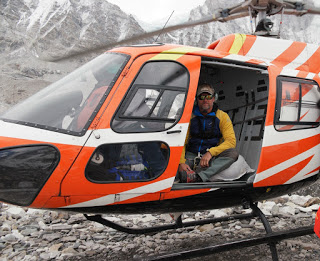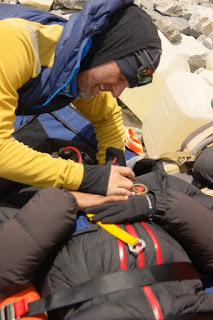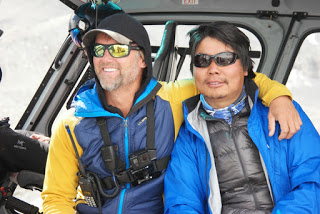On Wednesday, October 26, the Travel Channel will debut an all-new show entitled “Everest Air.” The six-part series, which was shot in Nepal this past spring, follows a high-altitude rescue team that provided medical assistance, support, and evacuations of climbers on and around the world’s highest peak.
For two months during the 2016 climbing season, a dedicated and experienced team of Sherpas and helicopter pilots, led by experienced mountaineer and medic Jeff Evans, went to great lengths to rescue climbers, guides, and local Nepalis living in the Khumbu Valley alike. “Everest Air” will give us a glimpse of what those operations were like, and how Jeff and his squad impacted the lives of those they helped.
Recently, I had a chance to chat with Jeff to get his thoughts on the show, the Everest climbing seven, what it was like conducting high altitude medical operations, and a lot more. It was clear from our conversation that this wasn’t just a television gig for him, but a chance to give back to both the mountaineering community and the Nepali people.
An adventurer and outdoor athlete, Jeff grew up in the Blue Ridge Mountains of North Carolina, where a love of the outdoors was instilled at a very young age. As he grew older, he immigrated west to Colorado where he attended college at UC Boulder where he studied medicine as he worked towards becoming a physician’s assistant. While there he also continued to hone his climbing skills, which would later take him up some of the more famous routes in Yosemite, Rocky Mountain, and Joshua Tree National Parks.
Later, he would branch into mountaineering as well, and eventually become a guide – and conducted search and rescue operations – on Denali in Alaska. In 2001, he even summited Everest along with blind climber Erik Weihenmayer, a long time friend that he would share many adventures with.
Last year, following the tragic earthquake that hit Nepal, Jeff returned to that country to help lend a hand. His experience as a search and rescue operator, along with his training as a medic, allowed him to play a vital role in the difficult days that came after that natural disaster. His deep love for the Nepali people, and a place that has given him so much throughout his climbing career, spurred him into action then, and was a major reason why he wanted to return once again this year to be a part of “Everest Air.”
“Initially, I was contacted to be a consultant for the show,” he tells me when we spoke over the phone. But after he inquired as to whether or not the production team had a medic on staff his role as part of the series evolved quickly. “They called me back the next day and asked if I could be on a plane to Los Angles. The rest is pretty much history,” he says.
But before he officially took the gig, Jeff says he told the producers that if he was going to be a part of the team, they had to truly be of service on the mountain. He didn’t want the show to revolve around rescuing rich, inexperienced mountaineers who found themselves out of their element on Everest.
He wanted to have a meaningful impact beyond the privileged foreign climbers that showed up in large numbers in the Himalaya. He said that the show’s creators agreed with his vision, and promised that they weren’t going to Nepal to exploit Everest for ratings – it was a promise they stuck to throughout filming.
Jeff and the members of his team gathered in Kathmandu on April 1, and stayed in the country until June 1. During that time, they made 89 total flights and conducted 38 rescues, of which 24 of those operations were in support of locals, including assisting a Nepali woman who had suffered a miscarriage. For Jeff, this was exactly what he had hoped for – assisting mountaineers in need, but more importantly lending a hand to locals who were in dire need of medical attention.
Most of the ailments that the foreign climbers suffered typically revolved around altitude sickness, with both pulmonary and cerebral edema being very common. But, over the course of two months they also helped individuals who suffered other injuries as well, including a broken back, a bowel obstruction, and one person that had taken a 30-foot fall. “Had we not been there,” Jeff says, “more people would have died on Everest this season.”
Despite his experience as a medic and a climber, adjusting to flying through the Himalaya in a helicopter took some time. “At first I wasn’t comfortable in the back of the helicopter,” Jeff tells me. “They’re just not meant to be flown at those altitudes,” he adds. But over time, and as he got to know the talented pilots, he learned to trust them more. “By the end of production, I was getting along just fine.”
When I asked if Jeff had seen any of the completed episodes for “Everest Air” just yet, he tells me that he hasn’t. But, when he was asked to do some post-production voice over work, he did get a look at the footage we’ll all see on our television screens in a few weeks time. “It looks intense,” he says, which should tell viewers something considering he was actually there when the events took place.
Jeff tells me that he is proud of how production went in Nepal, as he and his team stuck to the values they had hoped to adhere. Mainly, help those in need and make a difference in the local communities, something that will be evident when the show debuts. He also says that the entire production crew showed a great deal of respect for the individuals the medical team were assisting, something that runs counter to the reports we’ve heard from another television network crew that was operating on Everest at the same time.
With just six episodes to show us the entire spring climbing season, “Everest Air” is likely to be quite the action packed show. Obviously they won’t be able to show us all of the rescues they conducted, but you can count on plenty of edge-of-your-seat moments for sure. When I asked Jeff if there were any particular rescues that stood out the most, he quickly rattled off a string of different situations that came to mind. In the end, he settled on the operations they conducted that helped the local Nepalis the most as the ones that he’ll always cherish.
As viewers, we’ll get to decide which of the team’s adventures are the most entertaining and dramatic. “Everest Air” will debut in three weeks time on the Travel Channel starting at 10 PM Eastern Time. Be sure to tune in or set your DVR’s accordingly.
(All photos courtesy of Jeff Evans)
- Gear Review: The Xero Scrambler Mid is an Ultralight Hiking Shoe for Spring - March 1, 2023
- Gear Review: Yeti Roadie 48 Wheeled Cooler - August 18, 2022
- Kristin Harila Continues Pursuit of 8000-Meter Speed Record - August 16, 2022


